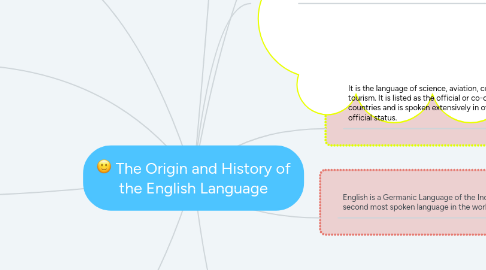The Origin and History of the English Language
by andres restrepo


1. The history of the language can be traced back to the arrival of three Germanic tribes to the British Isles during the 5th Century AD. Angles, Saxons and Jutes crossed the North Sea from what is the present day Denmark and northern Germany.
2. During the 7th and 8th Centuries, Northumbria's culture and language dominated Britain. The Viking invasions of the 9th Century brought this domination to an end (along with the destruction of Mercia). Only Wessex remained as an independent kingdom. By the 10th Century, the West Saxon dialect became the official language of Britain. Written Old English is mainly known from this period. It was written in an alphabet called Runic, derived from the Scandinavian languages. The Latin Alphabet was brought over from Ireland by Christian missionaries. This has remained the writing system of English.
3. At this time, the vocabulary of Old English consisted of an Anglo Saxon base with borrowed words from the Scandinavian languages (Danish and Norse) and Latin. Latin gave English words like street, kitchen, kettle, cup, cheese, wine, angel, bishop, martyr, candle. The Vikings added many Norse words: sky, egg, cake, Celtic words also survived mainly in place and river names (Devon, Dover, Kent, Trent, Severn, Avon, Thames)
4. Because the English underclass cooked for the Norman upper class, the words for most domestic animals are English while the words for the meats derived from them are French.
5. The Germanic form of plurals (house, housen; shoe, shoen) was eventually displaced by the French method of making plurals: adding an s (house, houses; shoe, shoes). Only a few words have retained their Germanic plurals: men, oxen, feet, teeth, children.
6. English is a Germanic Language of the Indo-European Family. It is the second most spoken language in the world.
7. It is the language of science, aviation, computing, diplomacy, and tourism. It is listed as the official or co-official language of over 45 countries and is spoken extensively in other countries where it has no official status.
8. It wasn't till the 14th Century that English became dominant in Britain again. In 1399, King Henry IV became the first king of England since the Norman Conquest whose mother tongue was English. By the end of the 14th Century, the dialect of London had emerged as the standard dialect of what we now call Middle English. Chaucer wrote in this language.
9. Modern English began around the 16th Century and, like all languages, is still changing. One change occurred when the th of some verb forms became s (loveth, loves: hath, has). auxiliary verbs also changed (he is risen, he has risen).
9.1. The historical influence of language in the British Isles can best be seen in place names and their derivations.
9.1.1. Since the 16th Century, because of the contact that the British had with many peoples from around the world, and the Renaissance of Classical learning, many words have entered the language either directly or indirectly. New words were created at an increasing rate. Shakespeare coined over 1600 words. This process has grown exponentially in the modern era.
